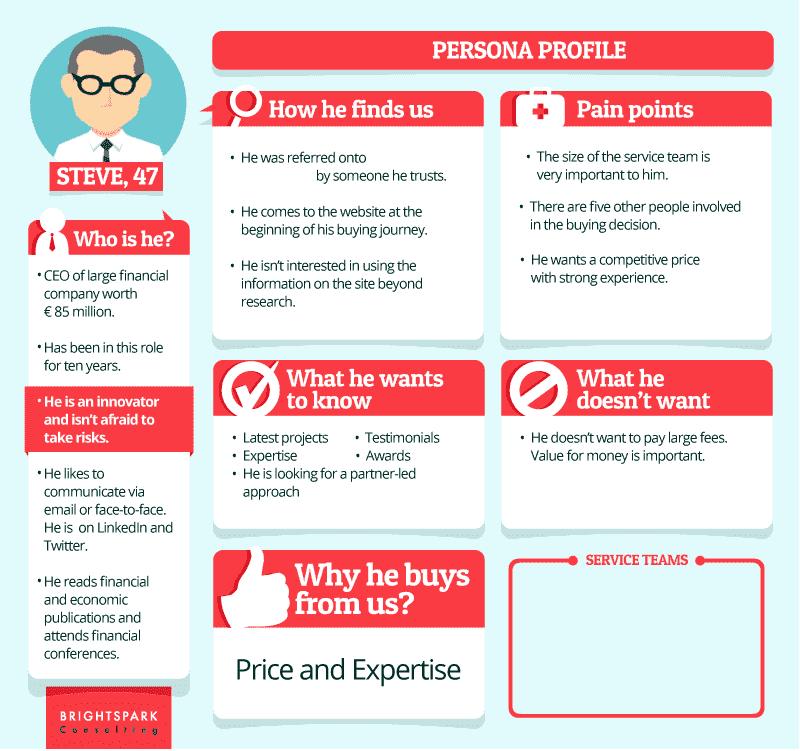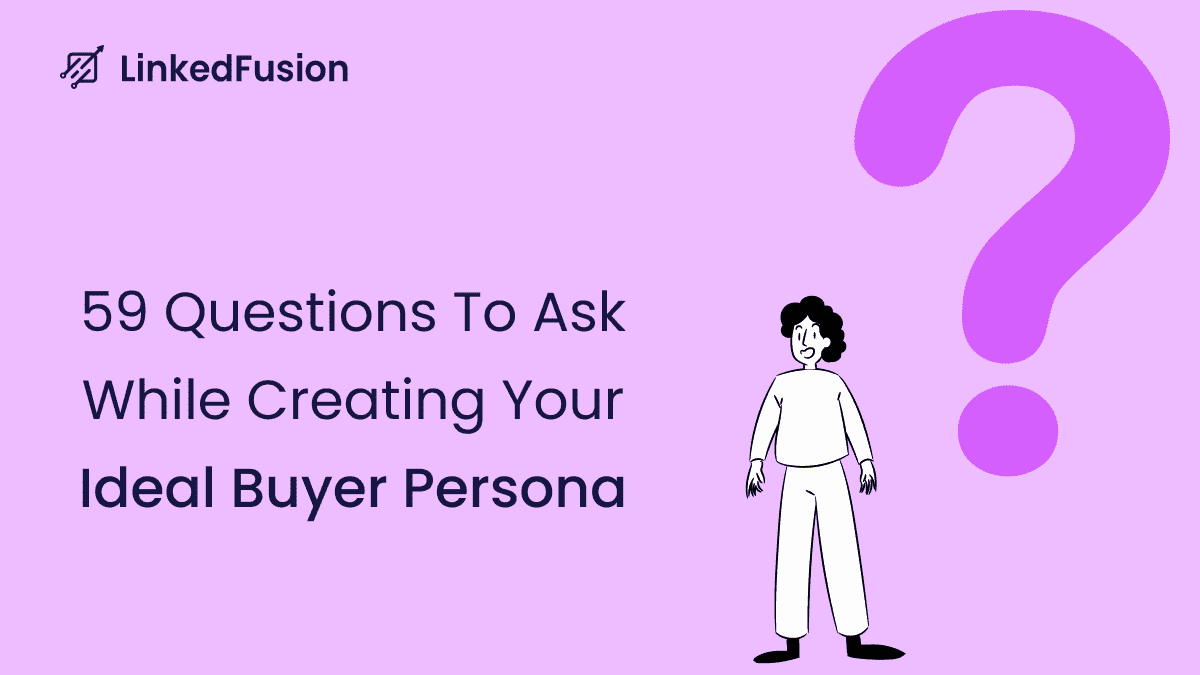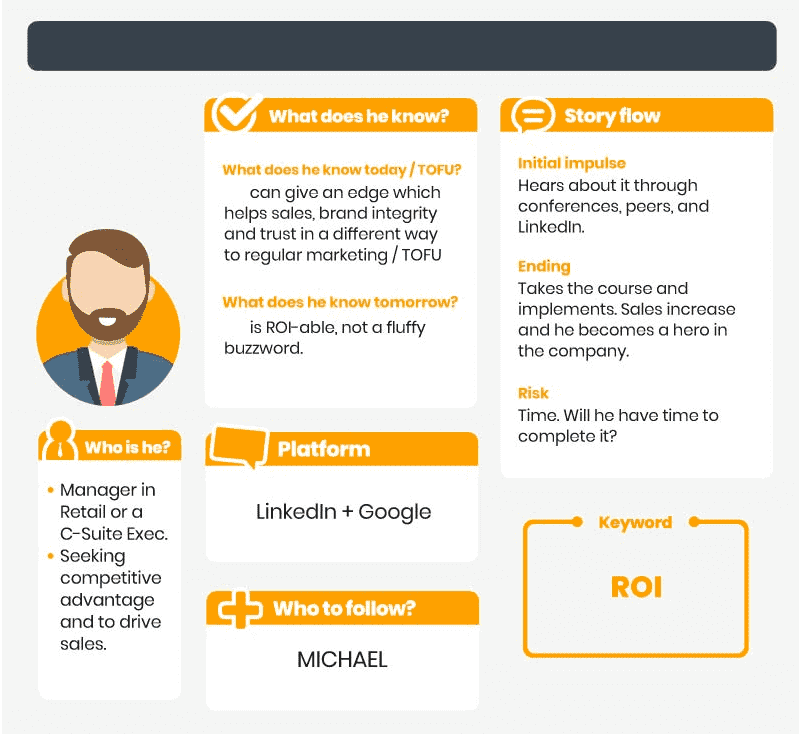Making wild guesses and assumptions about your target audience is one of the most expensive mistakes made by small and medium businesses today. Marketing or selling without creating ideal buyer personas is like shooting blind arrows. It may cause you a massive monetary and revenue loss in the business.
Creating an ideal buyer persona and basing your marketing strategy on these findings can be super-beneficial for your business. Buyer personas are nothing but semi-fictional customer personalities who form your ideal audience, created using existing customer data, market research, and observations.
Surveys show that creating buyer personas have made websites 2 to 5 times more effective and easier to use by their targeted users.
Buyer personas usually include data such as:
- Qualifications and education
- Demographics
- Motivations
- Behavior
- Pain points
- Objectives and goals
Getting a clearer understanding of your audience can completely transform your marketing campaign. In this article, you’ll get a fair understanding of questions that you should be asking while creating your buyer persona.

Table of Contents
ToggleBenefits of Creating Buyer Personas
Many people have an objection about creating buyer personas, as it might seem like a waste of time when you have other important tasks to focus on. Some might even feel that by creating buyer personas, they’re restricting your business’ reach. But these are all misconceptions!
By creating buyer personas, companies have been able to:
- Better understanding of buyers and hence better-targeted marketing campaigns.
- Improved value propositions.
- Better qualified leads and hence increased lead conversion rates.
- Increased profits for businesses.
Using these buyer personas, you can laser-target your content and ads in lead generation platforms such as LinkedIn, Facebook, Twitter, Emails, SMS, Instagram, and many more.
How to create ideal buyer persona?
Creating an ideal buyer persona involves understanding your target audience in depth. Here’s a simplified guide to help you get started :
- Research Your Audience:
– Look at your existing customer base.– Conduct surveys or interviews to gather insights.
– Analyze social media data and website analytics.
- Identify Demographics:
– Age, gender, location, occupation, income level.
- Understand Goals and Pain Points :
– What are their primary goals and objectives?
– What challenges or pain points do they face?
- Determine Online Behavior :
– Where do they spend their time online?
– Which social media platforms do they use?
– What kind of content do they engage with?
- Define Buying Motivations :
– What motivates them to make a purchase?
– Identify emotional triggers that influence their decisions.
- Create a Persona Profile :
– Compile all the information into a detailed persona profile.
– Give your persona a name and a face to make it more relatable.
- Segment Your Audience :
– If you have diverse groups, create multiple personas.
– Tailor your marketing strategies for each segment.
- Stay Flexible :
– Update your buyer personas regularly based on evolving market trends and customer feedback.
Remember, the primary idea is to go beyond basic demographics and truly understand the motivations and behavior for your audience for in-depth understanding. The more detailed and accurate your buyer persona, the better you can tailor your products, services, and marketing efforts to meet their needs.
Questions to Ask While Creating Buyer Personas
Now that you know the amazing benefits of creating buyer personas for your business, the question arises – how to create one? You may find yourself completely blank while trying to create an ideal buyer persona for your business.
Buyer personas can be fairly simple or quite complicated, based on the type of your business and goals. To simplify the process, you can start by answering the set of questions given in this article and move towards more complicated questions customized to your business.
Remember that the answers to these questions cannot be a hundred percent accurate. For example, if you state that your buyer persona is a male. It doesn’t mean that your marketing campaigns won’t target females at all. It just means that the majority of your customers are likely to be males.
1. Demographics and Personal Background
You should always start by asking questions related to demographics and background information. These questions are the easiest to find answers to and help paint a clear picture of the basics.
You may find some questions unnecessary or irrelevant, but you must trust the process. All these questions, whether they seem relevant or not, will help you with your marketing campaigns.
Here are some questions related to demographics and personal information:
- How old are they?
- Are they male or female?
- What is their marital status?
- Where do they live?
- Do they have children?
- What is their ethnicity?
- What is their annual household income?
- What is their educational background?
- What is their education level?
2. Current Occupation
Your buyers’ career and profession-related questions are crucial, especially if you are a B2B business owner. With these questions, you’ll be able to figure out their frustrations and objections (if any) in your buyer persona’s current job position. And you will also understand the details about their ideal job.
For instance, let’s say that you are offering content or copywriting services for B2B startups. Your buyer persona might be frustrated with creating content regularly for their website. They might not be good in their writing skills and feel like they should be focusing on other important tasks rather than creating pages and pages of content.
By understanding these aspects of your buyer’s occupation, you’ll be able to use their pain points to your advantage.
- What is their current occupation?
- In what industry do they work?
- What is their current job title?
- What is their annual income?
- How long have they been in the current company?
- How long have they been in the current position?
- Are they satisfied with their current job pay?
- Are they planning on switching jobs?
- What is their ideal job?
- What is the size of their company?
- Whom do they report to?
- What are their typical working hours?
- How do they measure their success?
- What skills do they need for their job?
- What tools do they use or need?
- How productive are they at their work?
- What does their typical workday look like?

3. Online Presence
Understanding your buyer’s most used social media platforms, timings, habits, etc. can be eye-opening for your businesses’ social media marketing campaigns.
- How often do they check their emails?
- What types of content do they consume the most?
- Which social media networks are they on?
- Which social media platforms do they use the most?
- How often do they check their social media?
- What time of the weekday or weekend do they spend the most time on social media?
- Which search engine do they use most often?
- Do they tend to make any purchases on social media platforms?
- How tech-savvy are they?
- Do they prefer online shopping?
- What is their preferred channel of communication?
4. Goals and Aspirations
Goals are again another important point to understand about your buyers. Using this information, you can figure out how you can add value to them, enabling them to move towards their personal or career aspirations. This way, you’re bound to generate more leads and increase lead conversions as well.
- What personal goals are they trying to achieve?
- What professional goals are they trying to achieve?
- Why are these goals important to them?
- What objections are they facing while trying to achieve their goals?
- What skills, products, or services do they need to achieve their goals?
5. Information Sources
Your prospects are always looking for reliable sources of information to help them with their day to day lives. You can use this information to fine-tune and pivot your content marketing strategy so that you get the maximum amount of traction and gain the most number of qualified leads.
- How do they learn about new information required for their job?
- What publications, blogs, and social media platforms do they consume most information from?
- What online forums or groups are they a part of (if any)?
- What information formats do they engage with the most?
- What part of the day or week is, they most likely to consume information?
- How comfortable are they about learning brand new skills?
- Which sources of information do they find the most reliable?
- How do they learn and research about any new products or services that they purchase?
6. Values, Pain Points, and Fears
Questions related to fears and values tend to be ignored more often. But you must remember that answering even a couple of these questions can get you way ahead of your competitors who haven’t thought about these things.
Such questions can be challenging to answer, and you might even find yourself blank while trying to answer these questions. Remind yourself that these answers are not your holy grail, but they are just for your reference to better understand your target audience better.
- What do they value the most in their personal and professional lives?
- What values do they always prefer to stand by?
- What are the objections that they might face while purchasing from your company?
- What drives their decision-making process?
- How would their life be without your products and services?
- What are the most frustrating pain points associated with their life, and how can you solve them?
- How much research do they do before making a buying decision?
- Are they likely to make impulsive buying decisions?
- Describe their recent purchase related to your industry.
Conclusion
Creating a buyer persona may seem time-consuming and confusing process. But, the payoffs that you’ll get out of this process are incredible. Even if you already have a buyer persona, try to keep updating them as your customer bases keep expanding, and market needs keep changing.
Once you have the ideal buyer persona ready with you, it will become just easier to target them on the right platform with the right campaigns. There are various mediums one can reach their target audience including LinkedIn outreach, cold emailing, text messages and so on.
Create your ideal buyer persona today and see your business KPIs changing for good!


